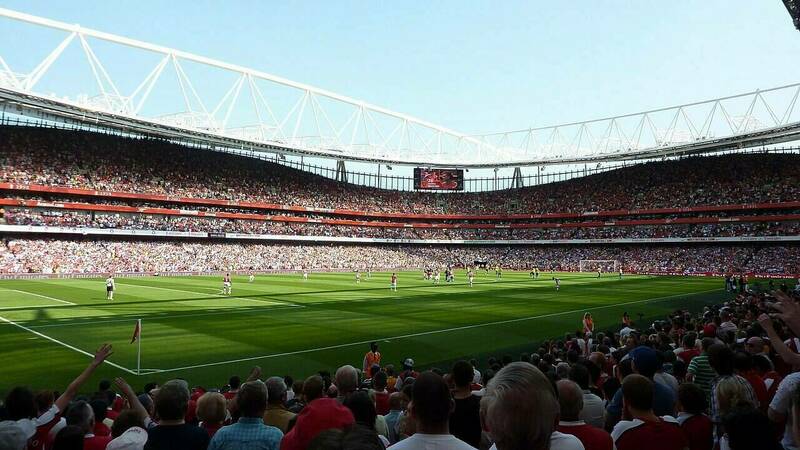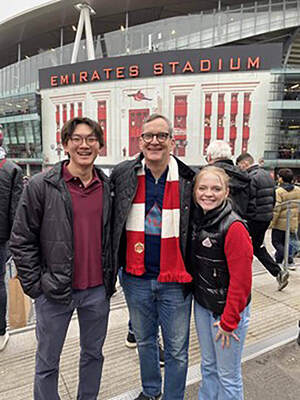 “Football is a prism or lens through which to understand British society,” McCabe says. Taking students to see his favorite team, Arsenal, brings the subject to life.
“Football is a prism or lens through which to understand British society,” McCabe says. Taking students to see his favorite team, Arsenal, brings the subject to life.
“What are the English known for nowadays?” muses Professor Thomas McCabe, historian, soccer enthusiast and Notre Dame London faculty member. “The Royal Family and the English Premier League.”
While the United Kingdom is a diverse, culturally complex country, McCabe has put his finger on a key part of its reputation in the wider world. Britain and the Global Game (HIST 34949) is McCabe’s Notre Dame London course examining British history, society and culture through the lens of the nation’s favorite sport — football, better-known to Americans as soccer. The sport is a worldwide phenomenon and a defining component of British life.
“The objective of the course,” McCabe says, “is to understand the history of the game from its codification in the 1860s, through professionalization, all the way to the formation of the English Premier League in the 1990s.”
His course doesn’t just explain football in technical terms. Although gameplay and the league system are exciting to dissect, there is much more to be discovered about the effect the sport has had on social history. McCabe says that “football is a prism or lens through which to understand British society.” Whether in the context of class, gender equality, regional identity or commercialization, studying football allows McCabe’s students to better understand the country they are living in for the semester.

McCabe’s interest in the sport started at a young age with what he describes as an “accident of geography,” growing up in a New Jersey soccer town. A player himself as young man, McCabe’s football career eventually turned primarily academic, but his love for the game has influenced not only his students but also his family: his son Tommy McCabe ’18 is now a professional midfielder for Loudoun United F.C. Despite Tommy’s professional allegiance to his own team, McCabe insists that his children still “have no choice but to support Arsenal Football Club.” They are a family of “Gunners” supporters through and through.
Football fandom, and particularly the fanaticism of the British club system, is another major focus of Britain and the Global Game. One of the course’s key texts is Nick Hornby’s Fever Pitch, a memoir about an Arsenal football obsessive. McCabe remembers that “one of the students said, as a die-hard Notre Dame fan, [he] knows what it is to be an obsessive fan.” While they are in London, McCabe asks his students to pick a local team to support throughout the semester to illustrate the loyalty and intensity of British football fans’ devotion to their clubs.
For some, pledging themselves to an English team temporarily isn’t so simple. “I’m originally from Brazil so I really support Palmeiras, but here in England I support Nottingham Forest,” Enzo Grieco ’24 says with a laugh. For Grieco, Britain and the Global Game is a way to combine passion for the game with an education to prepare him to work in soccer. “From what I can remember my life has always been filled with football in some way,” he says, “I see [taking this class] as a means of preparing me and enhancing my chances of eventually getting a job in the field.”
A highlight of the course was attending an Arsenal match at Emirates Stadium, courtesy of McCabe, a chance to experience the cultural zealotry of English football firsthand. The passion of the Arsenal fans, Grieco says, “reminded me of Brazil, of my team and of all the experiences I had back home with my parents, with my friends, watching football games . . . definitely the best experience I had this semester.”
Young Mu Lee ’24 agrees that attending the Arsenal match was “one of the coolest experiences I’ve ever had . . . I haven’t felt that atmosphere anywhere else.” Some students were particularly interested in studying the history of hooliganism and its relationship to the Premiere League, as well as the rowdiness they discovered at matches — attacking opposing teams’ vehicles, setting off flares in the stands, vulgar and sometimes violent chanting.
The intensity of fan behavior experienced in England is strikingly different from that in the United States. “It’s all very tribal and percussive,” recalls Jillian Casey ’24, “so it’s hard not to get caught up in the energy.” As a Tottenham Hotspurs fan, Casey jokes that she wasn’t too thrilled to be attending an Arsenal match, “but when your professor gives you his season tickets you can’t really say no to the shot at a Premier League game.”
Analyzing Arsenal fans didn’t stop in Emirates Stadium, however — the class took a tour with London Walks to explore the surrounding area. “There’s often a synergy between a neighborhood and a club,” McCabe says, “so we walked the neighborhood [between] different stadiums to really get a sense of place for that football club and its community.”
What does McCabe feel Britain and the Global Game adds to the study-abroad experience? First, he says, it provides “a more memorable, indelible way of broadening your education” in a foreign city. The course focus “fits so well with the students and their experience here. They’re in London, there are major clubs around . . . they can adopt a team for the semester if they don’t have one and really experience it week to week.”
“To go to a match, to go to a pub, to go on a walking tour enlivens the history,” McCabe says. “It leaps off the page into the experiential . . . and hopefully it’s a lasting memory.”
Caroline Lezny is the digital communications coordinator at Notre Dame London.